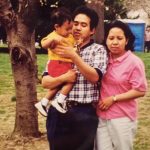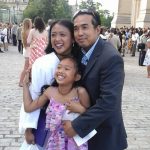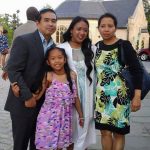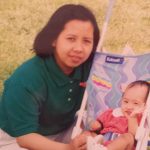Beginnings
I was born on July 27, 1997 to a newlywed immigrant couple. Although I do not remember most of it, in both of their interviews my parents spoke about the hardships we endured as a young and financially unstable family. However, I remember living a very well-supported and happy childhood. For all of my conscious memory, I have always had enough to eat and we have resided in constant homes, which were, first, our apartment in D.C. and, now, our house in Maryland.
Importance of Community
I think that the reason I felt like I lived such a comfortable childhood, despite my parents’ claims that our family started from nothing, is because my parents made sure I was surrounded by a number of different communities that served as support systems for my family. Of the communities that I was surrounded with, the two most prominent ones, and the ones that we are still an active part of, are our church community and our Filipino community.
Our church community, which we are so involved in because of my parents’ strong and persistent faith, has been fairly constant for as long as I was born. My family still goes to church every Sunday, and when I am back for breaks, I attend with them, without question. Everyone is very close and is so quick to support each other.
Our Filipino community, however, is the community that I truly see as my family. Because my parents are immigrants, upon arriving in the States and after spending so long away in a from their homes in the Philippines and in a different culture, they sought to find anyone else who shared their culture and traditions. Because of this, they flocked towards other Filipino immigrants who were in the same position as them – primarily new immigrants who didn’t have too grounded of footing. A lot of these Filipino immigrants also had kids around the time my parents had me, so I grew up with a lot of other first generation children, who I see as basically relatives to me. I think this community is so important for everyone involved because these families are drawn together through the shared experience of being new in America. Because these individuals left the comfort of their homes in the Philippines, they also left behind their families in order to make their own. All of these other Filipino families, then, serve each other in the way that when we get together, we are all like one huge extended family. I see my friends in this community as akin to cousins, and I literally call their parents “Tito” or “Tita,” which translate to uncle or aunt in Tagalog, respectively. All of these immigrants come from a country where the family – including the extended family – is so central to the culture. Although these people, in a way, lost their families in immigrating here, they found a pseudo-family in the States, with other families that share the same experience.
Concerted Cultivation or Natural Growth?
My early childhood was one of natural growth. I remember spending a lot of free time after school with another Filipino child of an immigrant family just one floor below us in our apartment building. We spent time with him trying to teach me how to play the Pokemon card game, or simply just watching TV. I vaguely remember this being more of splitting childcare between his parents and mine, as we would alternate playing in either his apartment or mine depending on the day, because both of our parents worked.
I remember that I spent the summer after fourth grade with another Filipino child and her single mother multiple times a week. The mother was out of work and offered to watch me over the summer because her daughter is the same age and my parents were working. We spent our days doing recreational activities, such as ice skating and swimming. That mother told my parents about the ice skating lessons that her daughter was taking, and mentioned that six lessons were less than $100, so my parents asked if I would like to continue taking lessons recreationally. I obliged, and, while stopping before learning any advanced jumps or spins, I still use the skills I learned in the current day, skating with my sister, camp counseling at an ice skating camp, and teaching beginner skating lessons when I go home for break.
The Importance of Education
I was in the D.C. public school system until sixth grade. This was actually not allowed, because we moved to Maryland after my third grade year, and public school policies do not allow children who live in a different zone, let alone a different state, to attend certain schools. My parents, very aware of the fact that this elementary school was one of the best D.C. public schools, spoke privately to the principal and a member of the administration to see if there was any way for me to stay. Eventually, the administration and my mother’s boss agreed to let my parents list our address as the address of my mother’s employer, who, at the time, lived in the same zip code.
In sixth grade, however, my parents had me apply for a number of different private schools in the area. I was widely unaware of what exactly I was doing, as I was barely 11 years old, but I remember going to take various standardized tests and doing interviews at different schools. In the end, I ended up at the National Cathedral School for Girls in NW, Washington, D.C., one of the most prestigious independent schools in the D.C. area. The school’s tuition hovered around $40,000 per year, and the school had given us a 98% scholarship which, to my parents, was a deal that could not be beat. Although there were notable private schools closer to my home, my parents knew the power of a good education, and were very willing to pay just under $1,000 a year on a secondary school education that would land me at a good college. My senior year, I was accepted into Dartmouth College, where I now am a student.
My entire academic career, from elementary school to, now, college, my parents have pushed me academically. They understand that, in America, education is very important for social mobility. In each of their interviews, they expressed to me that they pushed me so hard so that I would get into a good college, and, eventually, get a high-paying job. While less about the physical aspect of having money, my parents really just want me and my own family to live a more comfortable life than the one that they did, which was so unstable for so long. In essence, my parents sacrificed the comfort of their own homes and balanced so many different cultures so that, in the end, they could give their children the opportunity to thrive in America which, to every immigrant, is the land of opportunity.














